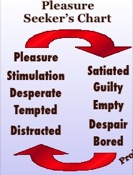
 Ecclesiastes 5:8-20
Ecclesiastes 5:8-20
The Bible Teaching Commentary
Discovering the Power of Contentment and the Danger of Discontentment
Bible Study Questions
Paul J. Bucknell
______________________
Introduction: Another perspective on wealth
This section in Ecclesiastes begins by shocking his audience. Actually Solomon tells them not to be shocked (Ecc 5:8)! There are many ways people gain wealth. Some are rather shocking. People are willing to go to all measures to get ahead in the wealth game.
___________________
Icebreaker:
-
Identify one wrong handling of money that you know of that shocked you.
-
Name three things that make you feel comfortable in life.
___________________
Our main purpose here is not to list the greatest scheme on how someone gypped another or to get caught up on the evil in the world. It is so easy to get lost in the evil surrounding us, especially if one stays current on the news. We want to get a better handle on why people, including ourselves, put so much value on material wealth.
Wealth and contentment are directly related to each other. After all, if we use our energies to get ahead, then we are not content. More than this, we are not grateful to God for what He has given to us.
Introduction: The Shock Treatment (Ecclesiastes 5:8-9)
8 If you see oppression of the poor and denial of justice and righteousness in the province, do not be shocked at the sight, for one official watches over another official, and there are higher officials over them. 9 After all, a king who cultivates the field is an advantage to the land (Ecclesiastes 5:8-9).
People become shocked as they become aware of various things going on around them. One happens when a person gets married and finds that wonderful spouse not quite as picturesque as one dreamed. Here is another.
- Summarize the picture of the world that Solomon describes in 5:8? What do you find that shocks you?
- Were you ever shocked to find someone that you trusted misused their authority or position.
- If you were in a position to gain from those 'under' you, would you take advantage of them? Why or why not? What makes you so sure?
Note on Ecclesiastes 5:9.
5:9 is best understood to mean that there is no turning back in life. Even though we might dislike the evil in a bureaucratic society, it is still better than returning to the nomadic days of the past. Taxes are inevitable. Corruption to some degree will occur because of the desires to have more.
A Different Perspective on Wealth (Ecclesiastes 5:10-17)
10 He who loves money will not be satisfied with money, nor he who loves abundance with its income. This too is vanity. 11 When good things increase, those who consume them increase. So what is the advantage to their owners except to look on? 12 The sleep of the working man is pleasant, whether he eats little or much. But the full stomach of the rich man does not allow him to sleep. 13 There is a grievous evil which I have seen under the sun: riches being hoarded by their owner to his hurt. 14 When those riches were lost through a bad investment and he had fathered a son, then there was nothing to support him. 15 As he had come naked from his mother's womb, so will he return as he came. He will take nothing from the fruit of his labor that he can carry in his hand. 16 And this also is a grievous evil--exactly as a man is born, thus will he die. So, what is the advantage to him who toils for the wind? 17 Throughout his life he also eats in darkness with great vexation, sickness and anger (Ecclesiastes 5:10-17).
Solomon has observed a lot about the effects of money or wealth on a person. This is one area he no doubted made many firsthand observations. After all, he was one of the richest men in the world.
- What does he say is vain in 5:10? Have you found this truth 'money doesn't make happiness' to be true? How so?
- 5:11 focuses on the heart of consumerism. What observation does Solomon make here in this verse? In light of this verse, finish the statement, "The more you have, the more ____________________."
- What contrast is made in 5:12? Which would you like to be? Really?
- Solomon again uses his phrase 'under the sun' to remind us of the world he is discussing, a world without God. What is the terrible thing that he observes to happen in 5:13?
- How does he support his argument made in 5:13 (see 5:13-15)? Have you heard of such a situation?
- What is the second terrible thing he observes (5:16)?
- Study 5:16-17 and list at least one way he again supports his thinking.
- Application. Do you think it is worth working hard and storing up if you have the opportunity? What is the risk? What is the advantage? What is another option?
God's Perspective on Wealth (Ecclesiastes 5:18-20)
18 Here is what I have seen to be good and fitting: to eat, to drink and enjoy oneself in all one's labor in which he toils under the sun during the few years of his life which God has given him; for this is his reward. 19 Furthermore, as for every man to whom God has given riches and wealth, He has also empowered him to eat from them and to receive his reward and rejoice in his labor; this is the gift of God. 20 For he will not often consider the years of his life, because God keeps him occupied with the gladness of his heart (Ecclesiastes 5:18-20).
Solomon starts with a shock treatment to get us evaluating the world we live in from a different perspective. He then hurls before us some penetrating questions which help us understand the values that we hold to and the decisions we make in life.
Solomon wants to guide us in the conclusion that we should make. He has given us a view from under the sun as promised, but every once in a while interjects God's point of view as he does here. Perhaps the secular viewpoint is too devastating. He can't help but declare the difference God can make in a person's life. This section stands as a summary for this section.
- How many times is "God" mentioned here in 5:18-20?
- Before you read Solomon's suggestions, what would you suggest to those embarking on a intense career path?
- What is Solomon's advice for that person heading off to a busy career? (See 5:18). How would you state that in your own words?
- By examining verse 19-20, how would you say that Solomon supports his alternative way of life?
- Application. How have you adopted or not adopted Solomon's suggestion? Do you think his suggestion is spiritual? Would God be happy with that kind of lifestyle? How do you know?
Summary Questions
Ecclesiastes 5:10 reveals a powerful truth: the clearest sign for discontentment is ungratefulness. As long as we desire more, we will not be satisfied with what we have. When we are satisfied with what we have, then we can rightly seek God and His will.
- "What is the purpose for your life?" has answers on various levels. Solomon is concerned about a person's general happiness. Would you say you have that general happiness? What threatens it?
- (5:18) Contentment is important but we must slow down and observe what we enjoy and delight in. What are several things that makes you content with life?
- (5:19) List three special things that the Lord has given to you? Thank Him for these things!
- (5:20) Do you get bored with life? What makes you that way? Sometimes we are so troubled with life because we are too busy getting and not happily rejoicing in a good God who cares for us.





